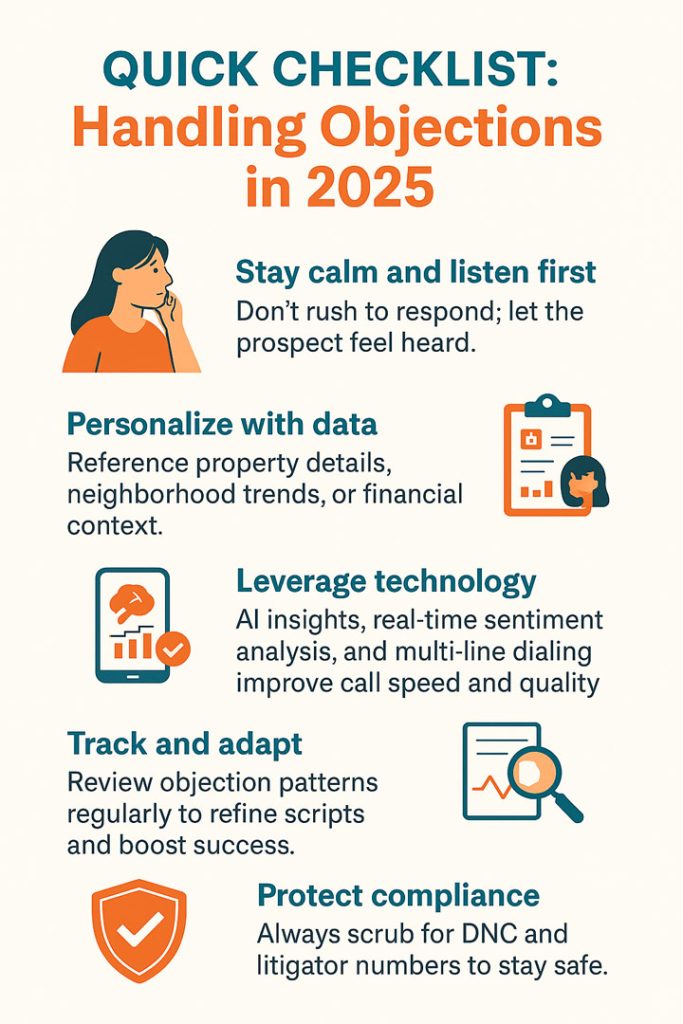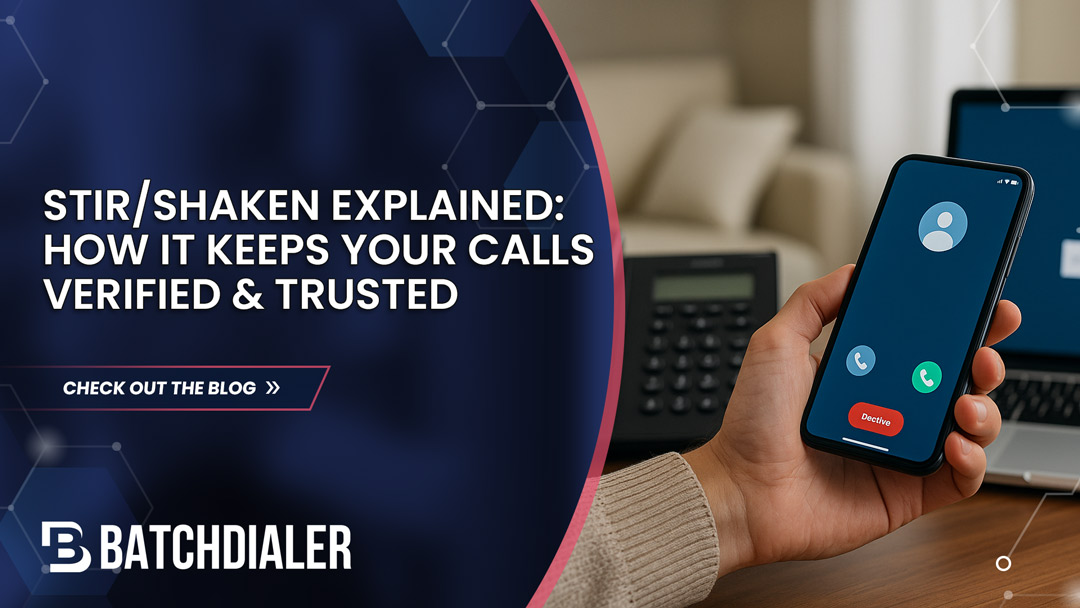Cold calling remains one of the most powerful tools for real estate professionals, sales reps, and entrepreneurs. But let’s be honest: Nobody loves getting objections. Sellers, homeowners, or prospects often respond with “I’m not interested,” “Now’s not a good time,” or “I already work with someone else.”
The truth? Objections are not deal-breakers; they’re opportunities. By preparing for them, you can build trust, guide the conversation, and ultimately book more appointments or close more deals.
In this article, we’ll break down the most common cold-calling objections and show you how to handle them effectively in 2025 and beyond, using the right strategies and tools, like BatchDialer, to give your team a competitive edge.
Why Objections Are Part of the Cold Calling Process
Objections don’t mean rejection. They simply mean your prospect needs more clarity, reassurance, or time. In fact, objections are a natural part of human decision-making.
Think of it this way: if someone didn’t have questions or concerns about your offer, they probably weren’t listening. Objections show engagement, offering you the chance to lean in, listen carefully, and guide the conversation. With features like predictive dialing and multi-line dialing, you can maximize your conversations and spend less time waiting for connections, giving you more chances to practice handling objections and build confidence quickly.
The Psychology Behind Cold Calling Objections
Behind every objection is a reason, and it usually has less to do with you and more to do with the prospect’s mindset. Understanding these underlying drivers helps you respond with empathy instead of frustration, and tailor your approach to what the person on the other end is feeling.
In most cases, objections can be traced back to one of three core factors:
- Fear – Prospects fear making a wrong decision.
- Skepticism – People are wary of sales pitches that sound too good to be true.
- Convenience – Timing and priorities matter; “I’m busy” often really means “Prove why this matters to me now.”
Addressing the underlying psychology can help you tailor your response and win trust faster. Real-time sentiment analysis makes it easier to detect fear or skepticism during a call and adjust accordingly. That’s precisely what BatchDialer’s AI Suite was designed for, helping agents respond with empathy so conversations feel natural, not scripted.
The Most Common Cold Calling Objections Examples
Here are the top pushbacks based on the feedback from real estate professionals:
- “I’m not interested.”
- “Now’s not a good time.”
- “I already have an agent/investor/vendor.”
- “Send me something by email.”
- “I don’t take cold calls.”
- “What’s this going to cost me?”
- “I need to talk to my spouse/partner.”
Understanding the most common objections is the first step, but memorizing this list alone isn’t enough to prepare for more specific objections. Let’s look at some more detailed objections and rebuttals that can help you turn the tables.
Rebuttal Examples for Real Estate Cold Calling Objections
Real estate professionals sometimes face unique cold calling objections that go beyond the usual “not interested” or “too expensive.” Homeowners may hesitate because of timing, loyalty to an agent, or skepticism about selling off-market. The good news is that with the right rebuttals, you can turn these objections into conversations that uncover motivation and build trust.
- Objection: “I’m not looking to sell right now.”
Response: “I completely understand. Many of the homeowners I work with weren’t planning to sell immediately either. But when circumstances changed, having an offer ready helped them make a faster, easier decision. Would you be open to a quick valuation so you at least know what your property is worth?” - Objection: “I already have a real estate agent.”
Response: “That’s great, you’ve already got someone helping you. May I ask, if an investor could bring you a cash offer that closes quickly, would you still want to see what that looks like?” - Objection: “I don’t do business over the phone.”
Response: “I completely understand. Many of my clients felt the same way, but they found that a quick conversation helped them explore options they hadn’t considered. Would you be open to a brief chat to see if it could be helpful for you too?” - Objection: “Your offer will be too low.”
Response: “I hear that concern a lot, and I want to be transparent. What I can do is prepare a valuation report that breaks down the property details and recent neighborhood sales, so you can see exactly how I arrived at the number. If it doesn’t work for you, no problem, you’ll still have useful information about your property.” - Objection: “I’m happy where I am.”
Response: “That’s always good to hear. Out of curiosity, if you did decide to make a change down the road, what would motivate that: more cash, a faster closing, or fewer repairs? That way, I’ll only reach out if I can bring you something that fits your priorities.”
By being empathetic yet assertive, you turn uncertainty into opportunity. The list above highlights some of the most common objections and rebuttals, but it’s by no means exhaustive; every conversation brings its own challenges. Modern dialing platforms address this issue, now providing in-call property and owner details and helping agents respond with confidence instead of relying on generic scripts.
Quick Checklist: Handling Objections in 2025
- Stay calm and listen first: Don’t rush to respond; let the prospect feel heard.
- Personalize with data: Reference property details, neighborhood trends, or financial context.
- Leverage technology: AI insights, real-time sentiment analysis, and multi-line dialing improve call speed and quality.
- Track and adapt: Review objection patterns regularly to refine scripts and boost success.
- Protect compliance: Always scrub for DNC and litigator numbers to stay safe.
You can save the infographic below for future reference on handling cold calling objections.

Video resource: Real Estate Cold Calling 101: BatchDialer Set-Up Secrets You Need to Know!
Closing Thoughts
Cold calling can come with challenges, but objections don’t need to end a conversation. Staying calm, listening carefully, and responding with empathy go a long way toward building trust. Using real-time insights to detect tone, referencing relevant property or market details, and refining your approach based on past conversations can turn what sounds like a “no” into a genuine opportunity. The more you practice, the more natural these moments feel, and the easier it becomes to help a prospect see the value you offer.
If you’re ready to handle objections more confidently, the right dialer can make all the difference. BatchDialer combines AI insights, multi-line dialing, and in-call property data to help you turn hesitation into opportunity and close more deals in less time.



